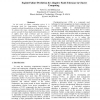Free Online Productivity Tools
i2Speak
i2Symbol
i2OCR
iTex2Img
iWeb2Print
iWeb2Shot
i2Type
iPdf2Split
iPdf2Merge
i2Bopomofo
i2Arabic
i2Style
i2Image
i2PDF
iLatex2Rtf
Sci2ools
116
click to vote
CCGRID
2006
IEEE
2006
IEEE
Exploit Failure Prediction for Adaptive Fault-Tolerance in Cluster Computing
As the scale of cluster computing grows, it is becoming hard for long-running applications to complete without facing failures on large-scale clusters. To address this issue, checkpointing/restart is widely used to provide the basic fault-tolerant functionality, yet it suffers from high overhead and its reactive characteriristic. In this work, we propose FT-Pro, an adaptive fault management mechanism that optimally chooses migration, checkpointing or no action to reduce the application execution time in the presence of failures based on the failure prediction. A cost-based evaluation model is presented for dynamic decision at run-time. Using the actual failure log from a production cluster at NCSA, we demonstrate that even with modest failure prediction accuracy, FT-Pro outperforms the traditional checkpointing/restart strategy by 13%-30% in terms of reducing the application execution time despite failures, which is a significant performance improvement for long-running applications.
Application Execution Time | CCGRID 2006 | Cluster Computing | Failure Prediction | Long-running Applications |
Related Content
| Added | 10 Jun 2010 |
| Updated | 10 Jun 2010 |
| Type | Conference |
| Year | 2006 |
| Where | CCGRID |
| Authors | Yawei Li, Zhiling Lan |
Comments (0)

